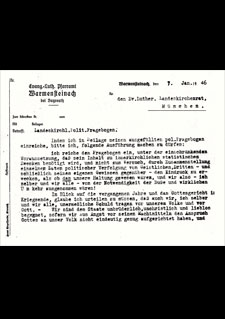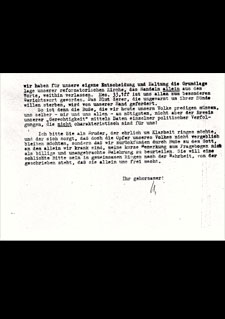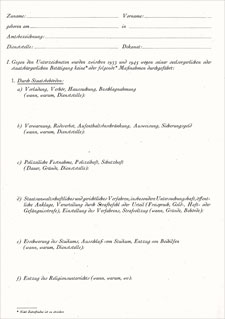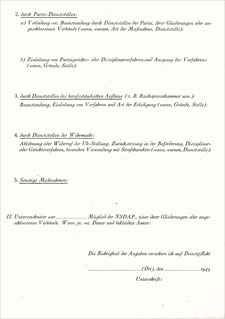Lone Critics
The Bavarian regional church’s portrayal of itself as an organization that had resisted National Socialism did not remain uncontested in the church. The regional church’s conduct during the Nazi regime was fiercely debated at the regional synod in Ansbach from July 9 to 13, 1946. Regional Bishop Hans Meiser (1881–1956) admitted to mistakes and confessed in his opening sermon: Not we saved the church. It could have died because of us. We failed often enough... Wherever we lacked courage, wherever God’s church followed the path of compromise was where we ceded one position after the other (quoted from B. Mensing, Vergangenheitsbewältigung, 355 f.).
This confession of guilt did not satisfy some members of the synod. They explicitly demanded penance for the lapses and wrong decisions of the Kirchenkampf. Two members of the Brotherhood of Pastors, who had acted especially courageously during the Kirchenkampf, were particularly harsh in their criticism: Pastor Wilhelm Griessbach (1907–1993) demanded that the Kirchenkampf not be apotheosized and bluntly established that we often did wrong and failed humanly, tactically, ecclesio-politically (ibid., 356). In addition, Pastor Waldemar Schmidt warned against a vote of confidence by the regional synod, which would have broadly sanctioned the church government’s action during the Nazi regime.
The call for repentance and change came precisely from such pastors whose resistance against the Nazi regime had gone far beyond the church government’s and had had to bear grave consequences as a result. They did not exempt themselves from their criticism. One of the most prominent was Wolfgang Niederstrasser (1907–1981), who had been interned in Dachau concentration camp and just barely escaped death. He answered a questionnaire about the Nazi state’s actions against pastors sent out the regional consistory at the end of 1945 self-critically:
Looking back on the past years ... I believe I have to conclude that we, too, I myself and all of us, bear immense guilt before our nation and before God. ... Thus, we ourselves – I and all of us – are most urgently in need of the repentance, which we have to preach to our nation today, but not of proof of our “righteousness” by means of data on individual cases of political persecution, which are not characteristic for us!
Pastor Karl Steinbauer (1906–1988), whose resistance had landed him in Sachsenhausen concentration camp, also called upon the church government to repent and change. As in the Nazi era, he criticized Regional Bishop Meiser, whom he considered to be on the path of unbelief and disobedience once again.
In the spring of 1946, Meiser had remarked to Steinbauer: We should have ventured much more in the past, and we also would have been able to, as developments have shown (K. Steinbauer, Zeugnis 4, 248). Steinbauer considered the statement “as developments have shown” to be an interpretation of the past as a random event that Christians would not been unable to alter in any way. He felt that this interpretation contradicted the claim of God's omnipotence and the obedience to Christ demanded of Christians.
The altogether small group of Bavarian pastors that had put up steadfast resistance against National Socialism was barely acknowledged in the regional church after the end of the Nazi regime and did not rise to positions of church leadership. Karl Steinbauer, the most important critic of the church government course during the Nazi regime, was not made a member of a single regional synod. On the contrary, the regional consistory admonished him in the spring of 1946 not to become highly politically active in the church any more in the future (K. Steinbauer, Zeugnis 4, 195).
Source / title
- © 1+2: Pfarramtsarchiv Warmensteinach 6




